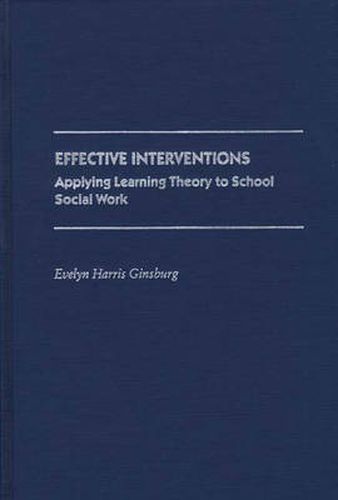Readings Newsletter
Become a Readings Member to make your shopping experience even easier.
Sign in or sign up for free!
You’re not far away from qualifying for FREE standard shipping within Australia
You’ve qualified for FREE standard shipping within Australia
The cart is loading…






This volume is written for therapists, school social workers, educational practitioners, and others who wish to provide psychological treatment to children from within the school environment. Evelyn Harris Ginsburg details the day-to-day functions and concerns of the school social worker, offering appropriate interventions that school social workers, no matter what their level of experience with applied behaviour analysis, student social workers, and other school personnel can use to assist pupils. This study provides reports of empirically validated procedures - interventions that work - and the study of children, to help them overcome a range of difficulties and to enhance their academic achievement. And, most of the procedures can be used not only by school personnel but also by the children themselves, family members, or friends working under the guidance of school social workers. The text, written in the language of learning theory, underlines the importance of environment in determining adjustment and advocates teamwork in schools and co-operation among those who deal with children in other settings. Divided into three major sections, the volume begins with an introduction that provides a compelling rationale for behaviour analysis in school social work. It also presents a history of behavioural analysis in schools and in social work and analyzes the current relation of the two. The central section is devoted to an explication of when to use behaviour analysis that focuses on behaviour problems related to school, home behaviour problems related to school, and problems in the local community that effect school behaviour. The final section addresses the components of the method, detailing useful interventions, parent training, and school related settings that favour behaviour analysis. The appendix offers a summary of the daily concerns of the behavioural school social worker, while a bibliography as well as subject and author indexes complete the volume. Effective Interventions embodies a challenge to use the environment to improve the functioning of children and offers sound, practice-based strategies for doing so.
$9.00 standard shipping within Australia
FREE standard shipping within Australia for orders over $100.00
Express & International shipping calculated at checkout
This volume is written for therapists, school social workers, educational practitioners, and others who wish to provide psychological treatment to children from within the school environment. Evelyn Harris Ginsburg details the day-to-day functions and concerns of the school social worker, offering appropriate interventions that school social workers, no matter what their level of experience with applied behaviour analysis, student social workers, and other school personnel can use to assist pupils. This study provides reports of empirically validated procedures - interventions that work - and the study of children, to help them overcome a range of difficulties and to enhance their academic achievement. And, most of the procedures can be used not only by school personnel but also by the children themselves, family members, or friends working under the guidance of school social workers. The text, written in the language of learning theory, underlines the importance of environment in determining adjustment and advocates teamwork in schools and co-operation among those who deal with children in other settings. Divided into three major sections, the volume begins with an introduction that provides a compelling rationale for behaviour analysis in school social work. It also presents a history of behavioural analysis in schools and in social work and analyzes the current relation of the two. The central section is devoted to an explication of when to use behaviour analysis that focuses on behaviour problems related to school, home behaviour problems related to school, and problems in the local community that effect school behaviour. The final section addresses the components of the method, detailing useful interventions, parent training, and school related settings that favour behaviour analysis. The appendix offers a summary of the daily concerns of the behavioural school social worker, while a bibliography as well as subject and author indexes complete the volume. Effective Interventions embodies a challenge to use the environment to improve the functioning of children and offers sound, practice-based strategies for doing so.